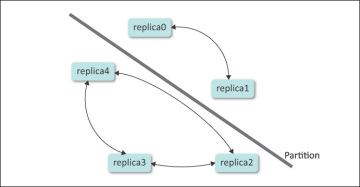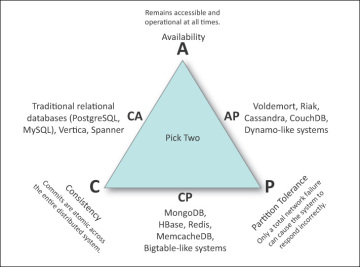1.5 The CAP Principle
CAP stands for consistency, availability, and partition resistance. The CAP Principle states that it is not possible to build a distributed system that guarantees consistency, availability, and resistance to partitioning. Any one or two can be achieved but not all three simultaneously. When using such systems you must be aware of which are guaranteed.
1.5.1 Consistency
Consistency means that all nodes see the same data at the same time. If there are multiple replicas and there is an update being processed, all users see the update go live at the same time even if they are reading from different replicas. Systems that do not guarantee consistency may provide eventual consistency. For example, they may guarantee that any update will propagate to all replicas in a certain amount of time. Until that deadline is reached, some queries may receive the new data while others will receive older, out-of-date answers.
Perfect consistency is not always important. Imagine a social network that awards reputation points to users for positive actions. Your reputation point total is displayed anywhere your name is shown. The reputation database is replicated in the United States, Europe, and Asia. A user in Europe is awarded points and that change might take minutes to propagate to the United States and Asia replicas. This may be sufficient for such a system because an absolutely accurate reputation score is not essential. If a user in the United States and one in Asia were talking on the phone as one was awarded points, the other user would see the update seconds later and that would be okay. If the update took minutes due to network congestion or hours due to a network outage, the delay would still not be a terrible thing.
Now imagine a banking application built on this system. A person in the United States and another in Europe could coordinate their actions to withdraw money from the same account at the same time. The ATM that each person uses would query its nearest database replica, which would claim the money is available and may be withdrawn. If the updates propagated slowly enough, both people would have the cash before the bank realized the money was already gone.1
1.5.2 Availability
Availability is a guarantee that every request receives a response about whether it was successful or failed. In other words, it means that the system is up. For example, using many replicas to store data such that clients always have access to at least one working replica guarantees availability.
The CAP Principle states that availability also guarantees that the system is able to report failure. For example, a system may detect that it is overloaded and reply to requests with an error code that means “try again later.” Being told this immediately is more favorable than having to wait minutes or hours before one gives up.
1.5.3 Partition Tolerance
Partition tolerance means the system continues to operate despite arbitrary message loss or failure of part of the system. The simplest example of partition tolerance is when the system continues to operate even if the machines involved in providing the service lose the ability to communicate with each other due to a network link going down (see Figure 1.8).

Figure 1.8: Nodes partitioned from each other
Returning to our example of replicas, if the system is read-only it is easy to make the system partition tolerant, as the replicas do not need to communicate with each other. But consider the example of replicas containing state that is updated on one replica first, then copied to other replicas. If the replicas are unable to communicate with each other, the system fails to be able to guarantee updates will propagate within a certain amount of time, thus becoming a failed system.
Now consider a situation where two servers cooperate in a master–slave relationship. Both maintain a complete copy of the state and the slave takes over the master’s role if the master fails, which is determined by a loss of heartbeat—that is, a periodic health check between two servers often done via a dedicated network. If the heartbeat network between the two is partitioned, the slave will promote itself to being the master, not knowing that the original master is up but unable to communicate on the heartbeat network. At this point there are two masters and the system breaks. This situation is called split brain.
Some special cases of partitioning exist. Packet loss is considered a temporary partitioning of the system as it applies to the CAP Principle. Another special case is the complete network outage. Even the most partition-tolerant system is unable to work in that situation.
The CAP Principle says that any one or two of the attributes are achievable in combination, but not all three. In 2002, Gilbert and Lynch published a formal proof of the original conjecture, rendering it a theorem. One can think of this as the third attribute being sacrificed to achieve the other two.
The CAP Principle is illustrated by the triangle in Figure 1.9. Traditional relational databases like Oracle, MySQL, and PostgreSQL are consistent and available (CA). They use transactions and other database techniques to assure that updates are atomic; they propagate completely or not at all. Thus they guarantee all users will see the same state at the same time. Newer storage systems such as Hbase, Redis, and Bigtable focus on consistency and partition tolerance (CP). When partitioned, they become read-only or refuse to respond to any requests rather than be inconsistent and permit some users to see old data while others see fresh data. Finally, systems such as Cassandra, Risk, and Dynamo focus on availability and partition tolerance (AP). They emphasize always being able to serve requests even if it means some clients receive outdated results. Such systems are often used in globally distributed networks where each replica talks to the others by less reliable media such as the Internet.

Figure 1.9: The CAP Principle
SQL and other relational databases use the term ACID to describe their side of the CAP triangle. ACID stands for Atomicity (transactions are “all or nothing”), Consistency (after each transaction the database is in a valid state), Isolation (concurrent transactions give the same results as if they were executed serially), and Durability (a committed transaction’s data will not be lost in the event of a crash or other problem). Databases that provide weaker consistency models often refer to themselves as NoSQL and describe themselves as BASE: Basically Available Soft-state services with Eventual consistency.
